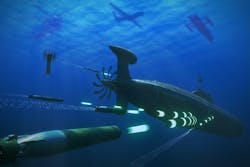Applied Physical Sciences continues effort to develop UUV undersea energy batteries in Blue Wolf project
Officials of the Naval Undersea Warfare Center (NUWC) in Keyport, Wash., announced a $992,000 contract modification to Applied Physical Sciences on Wednesday to continue the company's effort to develop a UUV batter prototype as part of the Blue Wolf program of the U.S. Defense Advanced Research Projects Agency (DARPA) in Arlington, Va.
The NUWC Keyport Division is administering contracting for the DARPA Blue Wolf program, which aims toward at-sea testing of undersea energy, hydrodynamic lift, and drag-reduction technologies.
The Blue Wolf program will develop and demonstrate integrated underwater vehicle prototypes able to operate at speed and range combinations previously unachievable in fixed-size platforms, while retaining traditional volume and weight fractions for payloads and electronics, DARPA officials say.
Applied Physical Sciences has been involved since 2015 in a part of the Blue Wolf program that seeks to develop approaches to hybrid energy systems development such as thermal, electrochemical, or energy-harvesting with two or more energy sources to improve energy efficiency measured in Watt hours per mile.
Applied Physical Sciences experts have been exploring thermal and electric sources like fuel cells and batteries that can fit within an undersea vehicle system module.
The company is developing a high-performance battery system prototype customized for the future Blue Wolf unmanned undersea vehicle. Last January was awarded a contract modification that increased Blue Wolf contract ceiling from $4.2 million to $5.8 million.
Other Blue Wolf contractors are the Boeing Defense, Space & Security segment in Huntington Beach, Calif.; the Lockheed Martin Mission Systems and Training segment in Riviera Beach, Fla.; and the Charles Stark Draper Laboratory in Cambridge, Mass.
Related: The U.S. Navy wants undersea gas stations for underwater drones
In addition to hybrid energy systems, the DARPA Blue Wolf project focuses on new enabling technologies for dynamic lift and drag reduction systems leading to a fast, low-drag, and energy-efficient undersea vehicle that will provide not only insights into the strengths, weaknesses, and risks in the prototype vehicle, but also provide alternative design strategies and concepts of operations.
Blue Wolf testing is on existing undersea vehicles at the U.S. Naval Undersea Warfare Center (NUWC) in Newport, R.I., and at the Penn State Applied Research Laboratory in Reston, Va. NUWC manages safety, certification, and vehicle development, while Penn State provides technical expertise.
The Blue Wolf program envisions a 21-inch-diameter vehicle with volume and weight reserved for baseline guidance, control, electronic systems, and payload section. The vehicle will use a baseline electric drive and conventional fin control.
For more information contact Applied Physical Sciences online at www.aphysci.com, NUWC Keyport at www.facebook.com/NUWCKeyport, or DARPA at www.darpa.mil.
Ready to make a purchase? Search the Military & Aerospace Electronics Buyer's Guide for companies, new products, press releases, and videos
